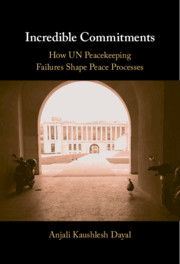Book contents
- Incredible Commitments
- Incredible Commitments
- Copyright page
- Contents
- Tables
- Acknowledgments
- 1 Introduction
- 2 The Social Context of International Peacekeeping and the Alternative Benefits of Bargaining
- 3 Methods and Case Selection
- 4 The Arusha Negotiations, 1990–1994
- 5 Guatemala, 1989–1996
- 6 Conclusion
- Bibliography
- Index
2 - The Social Context of International Peacekeeping and the Alternative Benefits of Bargaining
Published online by Cambridge University Press: 02 October 2021
- Incredible Commitments
- Incredible Commitments
- Copyright page
- Contents
- Tables
- Acknowledgments
- 1 Introduction
- 2 The Social Context of International Peacekeeping and the Alternative Benefits of Bargaining
- 3 Methods and Case Selection
- 4 The Arusha Negotiations, 1990–1994
- 5 Guatemala, 1989–1996
- 6 Conclusion
- Bibliography
- Index
Summary
Chapter 2 lays out the book’s theory, presenting the two hypotheses that guide the rest of the analysis: a distributional theory, where combatants where combatants are motivated by many different goals to seek out UN involvement in peacemaking and peacekeeping; and a credible commitment theory, where combatants are primarily motivated by security concerns. I begin by articulating the structural nature of peace operations, demonstrate how we can observe the social connection between peace operations by examining the high politics of the UN Security Council, and note multiple intellectual traditions anticipate this social connection. I then argue parties to conflict seek the UN’s involvement in negotiation and settlement because they are interested in the distributive and symbolic benefits of intervention— not just international actors’ abilities to manage mistrust between warring parties and resolve credible commitment problems, but what intervention can give them, and what international actors can bring to the post-conflict state.We may be better poised to understand why parties to a conflict seek out UN peacekeeping if we reframe it as a potential solution to a range of security, tactical, material, and symbolic problems. The chapter concludes with observable implications for both hypotheses.
Keywords
Information
- Type
- Chapter
- Information
- Incredible CommitmentsHow UN Peacekeeping Failures Shape Peace Processes, pp. 12 - 52Publisher: Cambridge University PressPrint publication year: 2021
